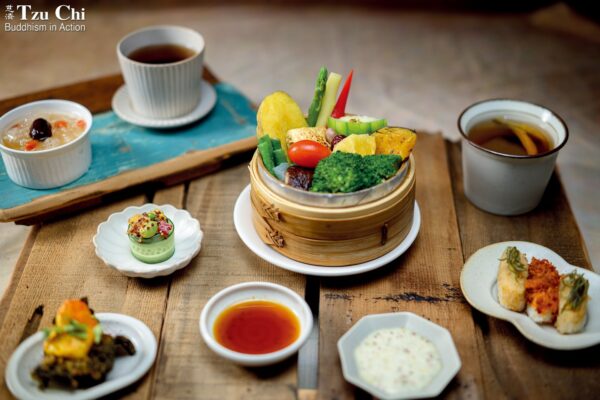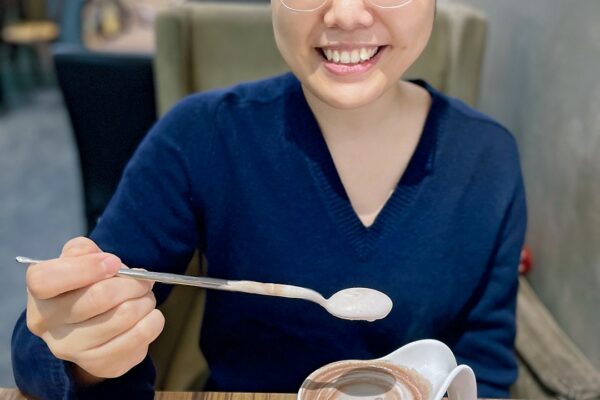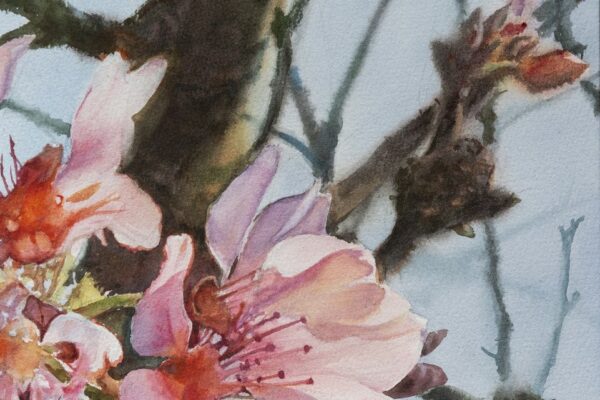By Sammi Huang
Translated by Wu Hsiao-ting
Photos by Kelly Zhen
Ukrainian refugees in Canada need the most basic of items to help them start their lives anew. Tzu Chi volunteers are helping to meet their needs.
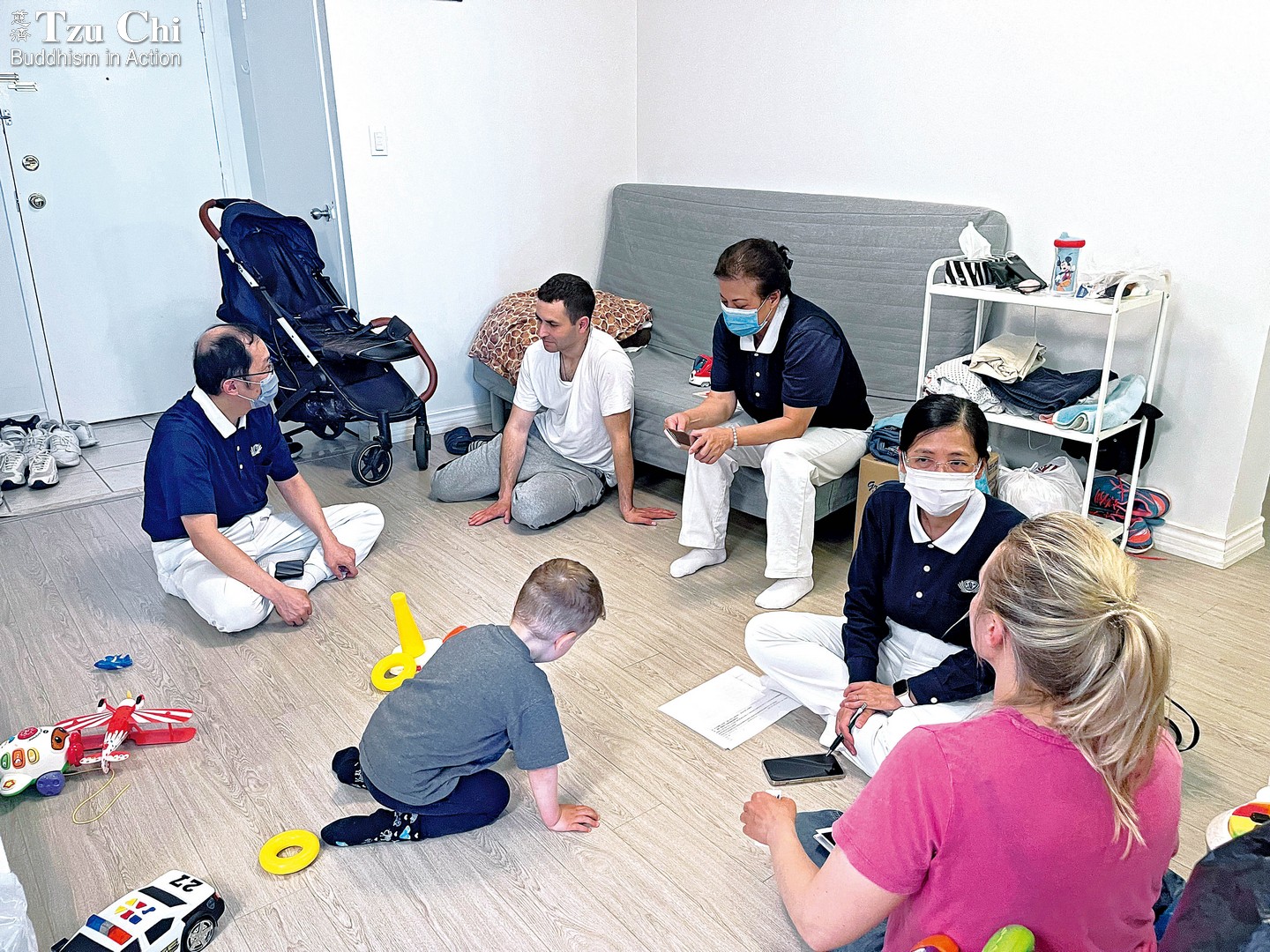
Tzu Chi volunteers visit Tetiana, Yuriy, and their family, newly arrived in Canada from Ukraine.
Tetiana, 39, was shaken awake by her husband, Yuriy, 37, on the night of February 24, 2022. He told her the war had started and a missile had hit an apartment near their home. Wasting no time, they started packing important items in case they needed to flee.
An air-raid alarm cut the air at unpredictable times over the next few days: three in the afternoon, six in the evening, five in the morning—sometimes even in the depth of night. Every time the siren blared, Tetiana and Yuriy would grab their two children, both under three, and hurry to a basement air-raid shelter. Their nerves were frayed after a few days like this. This is how they came to a tough decision: to flee Ukraine immediately, even though it meant leaving their home and car behind.
Accompanied by Yuriy’s mother, 62-year-old Iryna, the family set off from Kyiv. They fled to eastern Poland first, then continued to Germany. They eventually landed in Canada on March 31. Their trip wasn’t an easy one. Since there were five of them, just buying plane tickets was difficult, not to mention having to cope with the feelings of helplessness and fear that beset them during the journey.
Tetiana was a lawyer in Ukraine. Both she and her husband were highly educated and held high-paying jobs. But now their family of five had no choice but to settle in Yuriy’s brother’s living room. “I really can’t imagine a war happening in the 21st century,” said Tetiana.
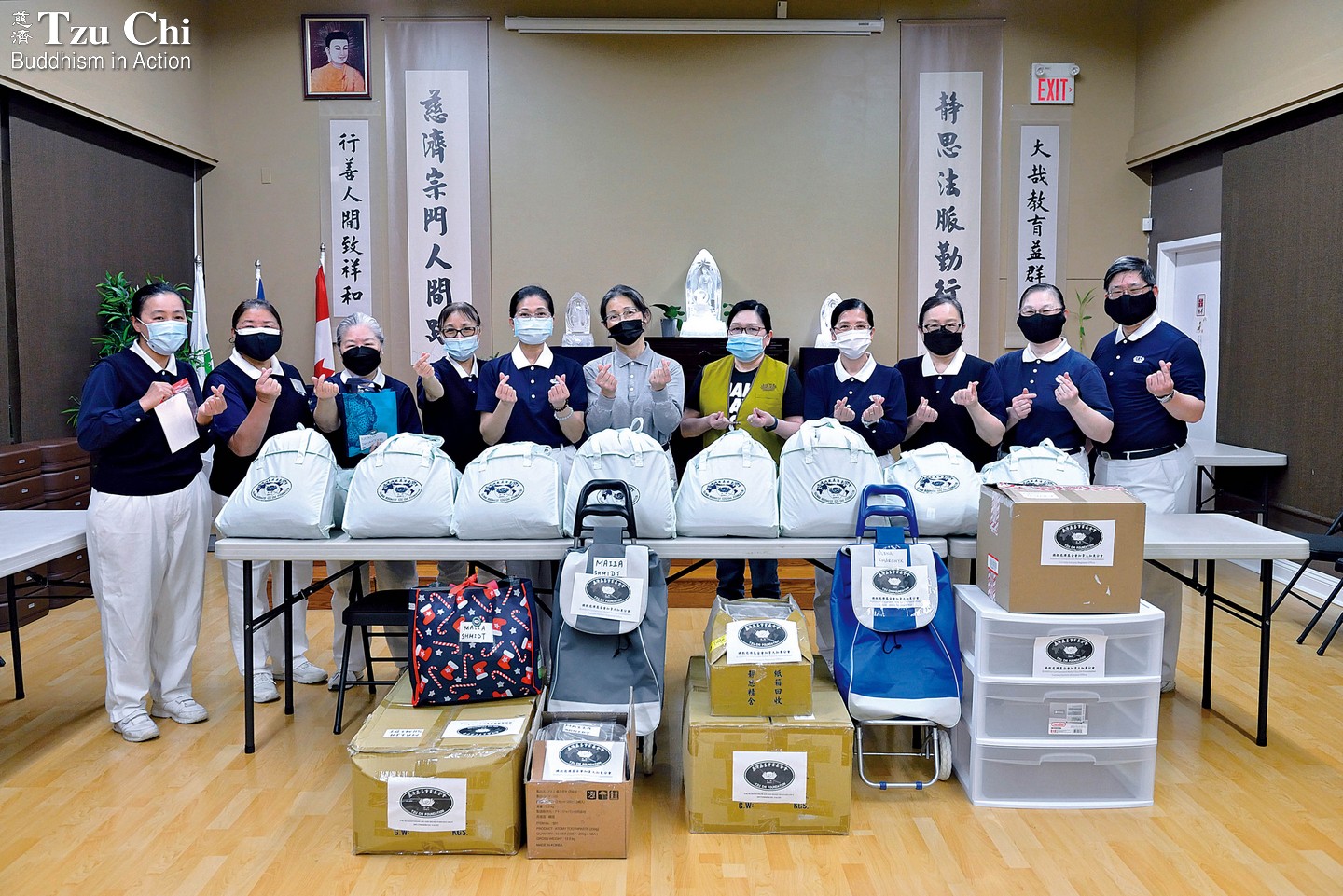
Volunteers pose after packing items to be given to Ukrainian refugees in a distribution scheduled for May 15.
The first step: mastering English
Russia invaded Ukraine on February 24, 2022, forcing millions of Ukrainians out of their country and triggering a humanitarian crisis. The Canadian government responded by giving priority to applications for asylum from Ukrainians. The first batch of newcomers arrived in the country in early March. They were offered three-year work permits and access to health care, education, and other benefits.
The Nativity of the Mother of God Orthodox Church in Richmond Hill, Ontario, is about three kilometers (1.9 miles) from the Tzu Chi North Toronto office. The church started caring for newly arrived Ukrainian refugees in April. When Tzu Chi volunteers learned that the church needed help with their work, they met Reverend Art Lambert online to determine how the foundation could assist. The reverend is also a practicing lawyer specializing in immigration and family law, so he was also helping refugees apply for permanent Canadian residency.
Rev. Lambert told the volunteers in the online meeting that the church was focused mainly on newcomers with no relatives in Canada. Most of them were women and children. He observed that most of the Ukrainians had come to Canada empty-handed, with nothing but their passports and the clothes on their backs. Another obstacle for them was the language barrier. Everything combined was making it hard for them to start their new lives in the country. They needed almost everything, from small daily essentials such as toothpaste and toothbrushes to larger items such as furniture. Some community residents had donated clothes and other items to the church, but 80 percent of the donated items were not fit for use. The reverend thus expressed hope that Tzu Chi could provide practical things that the newcomers could put to good use.
After the meeting, Herbert Cheng (鄭楊河), CEO of Tzu Chi Eastern Canada, decided that Tzu Chi would quickly move to help. Volunteers carefully reviewed the lists of needed items provided by Rev. Lambert. Some of the needed items, such as slippers, sneakers, and underwear, would be difficult to purchase because every recipient required their own size. As a result, they decided to include gift cards among the other types of aid to help the newcomers buy directly what they needed. Every newcomer would receive a card worth 150 Canadian dollars (US$115).
Tzu Chi held its first distribution on April 25. A woman had noted in her list of needed items that she hoped to receive a stroller and a car seat. She said she had two children, a two-year-old and a 15-year-old, and that there was a new baby coming, due the following month. She was very happy when she came to the distribution and learned that she’d receive a two-in-one stroller and car seat that day. She shared with Tzu Chi volunteers that she was an accountant in Ukraine. She hoped to master English as soon as possible to help her land a job after her baby was born so that she could support her children.
In addition to gift cards and requested items, volunteers prepared a care package for each refugee, containing a Tzu Chi eco-blanket, a bottle of hand sanitizer, a bottle of disinfectant wet wipes, and a box of face masks.
Volunteers noticed during the event a woman who had remained silent from the beginning. They struck up a conversation with her, aided by Rev. Lambert as the interpreter. The woman explained that her hometown was located in Mariupol, one of the areas in Ukraine that had suffered the most destruction from the war. She had requested clothes, footwear, and socks, as well as a set of cookware and tableware. She had been in Canada for nearly two months, and yet hadn’t been able to obtain such basic goods yet. The conversation helped the volunteers realize how difficult it could be for the refugees to obtain even the most basic supplies.
Another woman had arrived in Canada with her parents, both getting on in years. She said that her hometown was located among the battlefields of eastern Ukraine. They had even once seen a missile whiz by their apartment. She and her family had spent days in their basement before finally deciding to up and leave. Her immediate goal now was to master English and get a job. Speaking of the aid from Tzu Chi, she said she was impressed that people who didn’t know them and who weren’t even of the same ethnic or cultural background as they would reach out to them like this. She found it very touching.
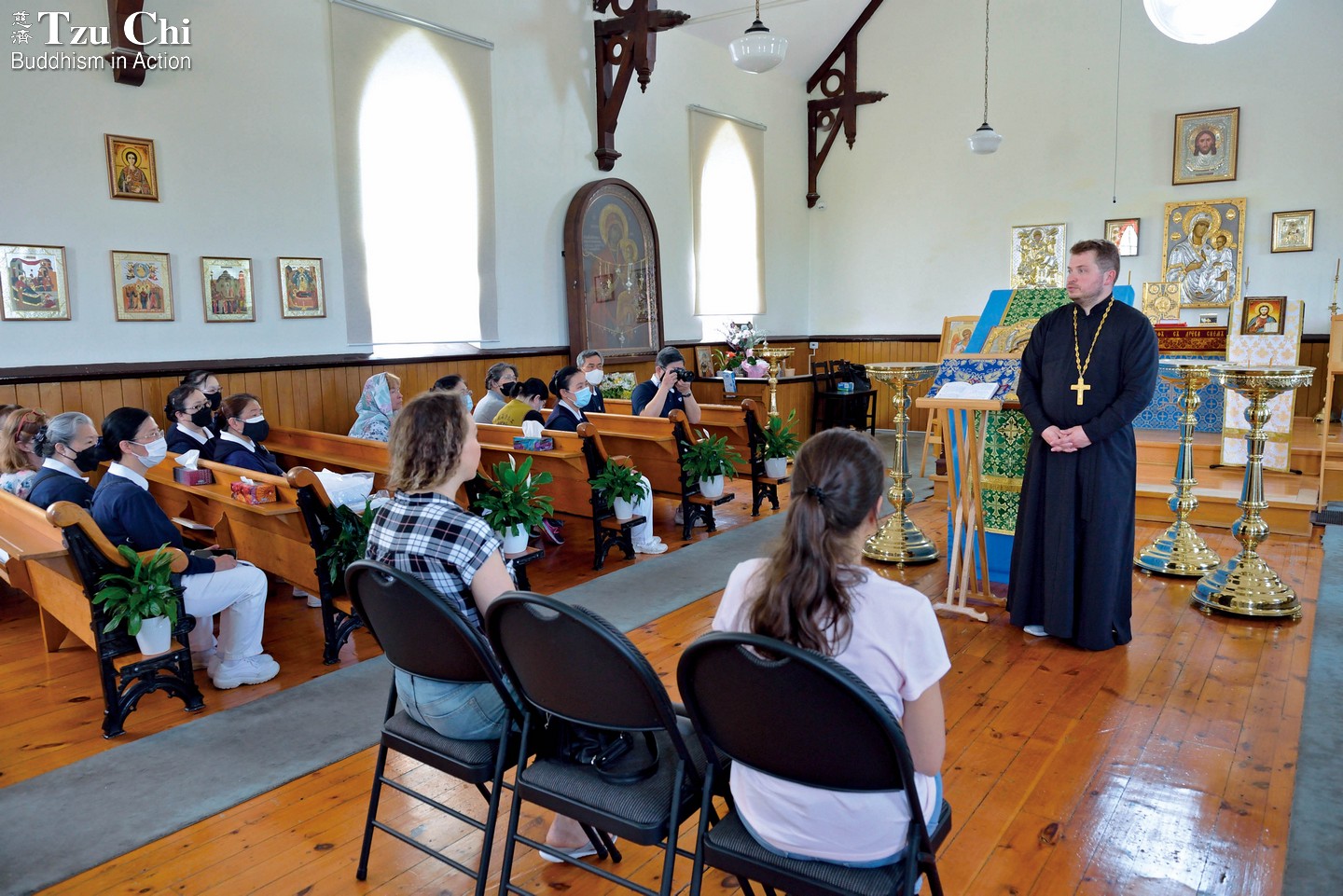
Father Andriy speaks during a Tzu Chi distribution for Ukrainians in the Nativity of the Mother of God Orthodox Church in Richmond Hill, Ontario.
They have nothing
Volunteers conducted another distribution on May 15, benefiting another five families. The items requested included all sorts of clothes, footwear, and socks. Because the weather was warming up, two families hoped to receive electric fans. Two families asked for trolly bags; without vehicles, they would make their trips to a supermarket on foot easier.
Other things requested included cookware, cutlery, kettles, and bath towels. Volunteers’ hearts were wrenched by a requested list of basic items followed by the addendum: “The family indicates they have nothing.” Feeling for the refugees, three volunteers spent a whole day getting the things on the lists ready. They completed their mission a couple of days before the distribution was to take place, after visiting five large retail stores. When packing the goods, volunteers thoughtfully wrote the name of each recipient on the items, then pasted on a sticker bearing a Tzu Chi logo.
Two of the five families scheduled to come to the distribution were unable to show up in the end: they had to isolate themselves at home due to COVID-19 infections. Father Andriy, of the Nativity of the Mother of God Orthodox Church, signed on their behalf. The church would then arrange for the gifts from Tzu Chi to be passed on to them. During the event, the priest made a short speech in English and Ukrainian. He pointed out that many Ukrainians had left all they had in their homeland and had arrived in Canada empty-handed. “Let’s pray that Canada can become their new home.”
One of the Ukrainian women who had come to the distribution shared a piece of good news with Tzu Chi volunteers—her husband had found a job with a moving company. But this happy news aside, she was worried for her mother and daughter because they were still in Ukraine. She couldn’t wait for the war to end. Another woman had come to the event with her two children, aged six and 12. Her requested items included building blocks, a soccer ball, and paint brushes and paper for watercolors. While their lives were going through such cataclysmic changes, she hoped that her children would find some comfort in painting and playing sports.
They are safe now, but…
Liubov was a Ukrainian woman who had accompanied a friend with a broken leg to the distribution. When she saw how well organized the volunteers were and their genial and kind manners, she got up enough courage to ask them for help. She said that her husband’s younger brother, Yuriy, his wife, Tetiana, and other family members had fled the war in Ukraine and were now living in her apartment. (Yuriy and Tetiana were the couple described at the beginning of this article.) Liubov explained that she and her husband were not doing well enough to give their relatives all the help they needed and that it would mean a lot to them if Tzu Chi could help.
A group of volunteers visited the woman’s home in Scarborough on May 20. Liubov lived with her husband and 12-year-old son. Their apartment wasn’t large to begin with, but now had to accommodate five more people. A double bed and two cribs had been added to the living room, while a sofa bed had been placed in the vestibule. Though it was crowded, the volunteers could see that everyone was doing their best to keep the environment clean and tidy.
Tetiana was feeding food to her three-year-old son when the volunteers arrived. The volunteers’ interactions with the family were a little awkward at first but soon warmed up. Volunteer Andersen Chu (朱啟誠) sat on the floor and chatted easily with Yuriy, the young father, looking like friends. Yuriy has a PhD degree and was a department manager at a logistics company when he was in Kyiv. He had already obtained a work visa in Canada and was working hard to find a job. But it hadn’t been going well because he had no work experience in Canada. Chu gave him some advice and offered to look at his resume and help improve it so that it might be easier for him to secure a job.
Volunteer Jane Huang (黃淑珍) sat off to one side talking to Tetiana. Tetiana said that though they were now safe in Canada, her heart was still full of sadness when she looked back on the huge changes that had taken place in their lives over the last three months. Huang took out a copy of Jing Si Aphorisms (a collection of short sayings by Dharma Master Cheng Yen) and gave it to the mother of two. The book was a four-language edition. Huang suggested that Tetiana open it to a random page and read it whenever she felt troubled by anything in life—she might find peace in the Master’s wise words. Tetiana opened the book and saw this sentence: “Though we shouldn’t think too highly of ourselves, we oughtn’t underestimate ourselves either.” Reading it, Tetiana told Huang she would be stronger for her two children.
She added that never in her wildest dreams had it occurred to her that war would break out, but she was deeply grateful to all those who had helped them along the way. She thanked the volunteers for the blankets, face masks, hand sanitizer, and gift cards they had brought, especially the gift cards. She said the cards were very important to them.
Before the volunteers left, they introduced the Ukrainian version of the Tzu Chi song “One Family” to the family. Everyone was pleasantly surprised. The soft melody and moving lyrics warmed the family and encouraged them to bravely face the challenges ahead.
Volunteers held more distributions in June and July and will continue to reach out to newcomers displaced by the war. Our world isn’t perfect. That’s why we need love.
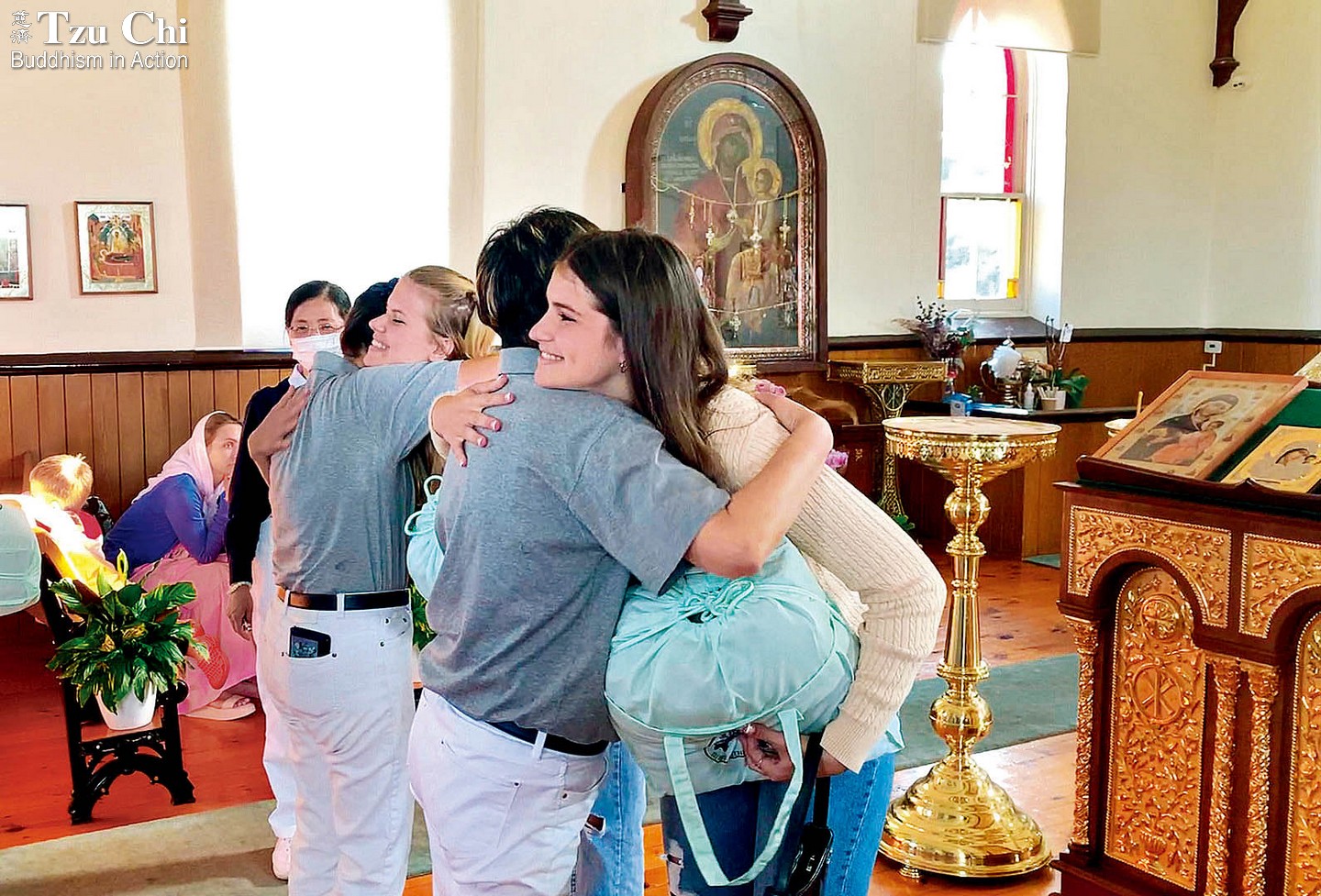
Volunteers hug newcomers from Ukraine in a distribution held on July 21. The event helped ten families. Francis Leung

